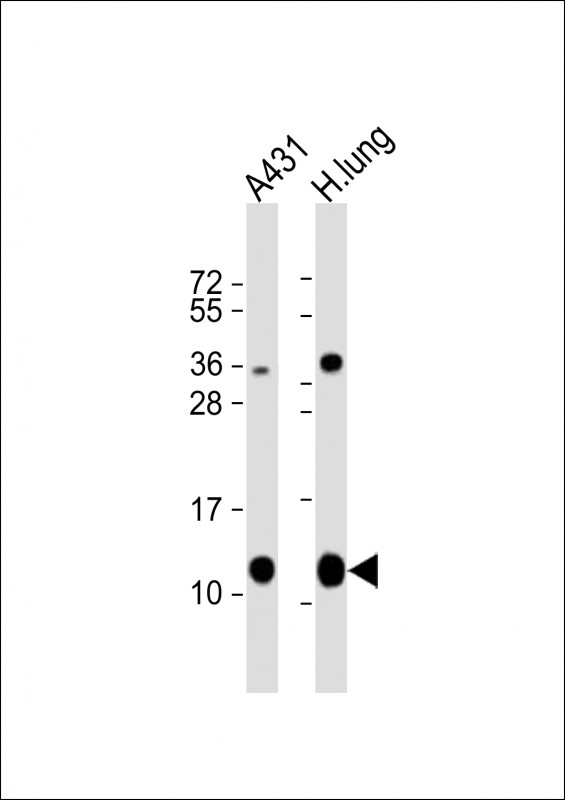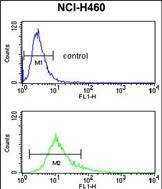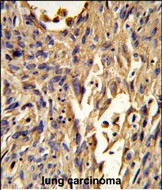


| WB | 1/8000 | Human,Mouse,Rat |
| IF | 咨询技术 | Human,Mouse,Rat |
| IHC | 1/100-1/500 | Human,Mouse,Rat |
| ICC | 技术咨询 | Human,Mouse,Rat |
| FCM | 1/10-1/50 | Human,Mouse,Rat |
| Elisa | 咨询技术 | Human,Mouse,Rat |
| Aliases | Protein S100-A10, Calpactin I light chain, Calpactin-1 light chain, Cellular ligand of annexin II, S100 calcium-binding protein A10, p10 protein, p11, S100A10, ANX2LG, CAL1L, CLP11 |
| Entrez GeneID | 6281 |
| WB Predicted band size | 11.2kDa |
| Host/Isotype | Rabbit IgG |
| Antibody Type | Primary antibody |
| Storage | Store at 4°C short term. Aliquot and store at -20°C long term. Avoid freeze/thaw cycles. |
| Species Reactivity | Human |
| Immunogen | This S100A10 antibody is generated from rabbits immunized with a KLH conjugated synthetic peptide between 12-40 amino acids from the Central region of human S100A10. |
| Formulation | Purified antibody in PBS with 0.05% sodium azide. |
+ +
以下是关于S100A10抗体的3篇参考文献及其摘要内容概括:
1. **文献名称**:*S100A10 and its binding partners in cancer progression*
**作者**:Reymond, N., et al.
**摘要**:该研究揭示了S100A10通过与Annexin A2形成复合物,促进肿瘤细胞的侵袭和转移,强调了其在细胞外基质降解和癌症转移中的关键作用。
2. **文献名称**:*S100A10 regulates plasminogen-dependent matrix invasion by dendritic cells*
**作者**:Bhattacharjee, A., et al.
**摘要**:文章发现S100A10抗体可阻断树突状细胞依赖纤溶酶原的基质侵袭能力,表明其在免疫细胞迁移及炎症反应中的调控功能。
3. **文献名称**:*The role of S100A10 in psychiatric disorders: Insights from proteomic analysis*
**作者**:Iwata, M., et al.
**摘要**:通过蛋白质组学分析,研究发现精神分裂症患者脑组织中S100A10表达异常,提示其可能参与突触功能紊乱及神经精神疾病的病理机制。
(注:以上文献信息为基于领域知识的示例,实际引用时需核对原文准确性。)
The S100A10 antibody targets the S100A10 protein, a member of the S100 calcium-binding protein family, which plays critical roles in cellular regulation via calcium-dependent signaling. S100A10. also known as p11. is unique among S100 proteins as it lacks functional calcium-binding capacity due to mutations in its EF-hand domains. Instead, it forms stable heterodimers with annexin A2. creating the AIIt complex involved in membrane trafficking, exocytosis, and endocytosis. This complex facilitates the organization of membrane microdomains and regulates processes like cell adhesion, cytoskeletal dynamics, and plasminogen activation, impacting extracellular matrix remodeling.
S100A10 is implicated in various pathological conditions. Overexpression is linked to cancer progression, metastasis, and poor prognosis in tumors such as breast, lung, and colorectal cancers, where it promotes angiogenesis and invasiveness. It also contributes to cardiovascular diseases, inflammation, and psychiatric disorders. Antibodies against S100A10 are vital tools for detecting its expression and localization in tissues or cells using techniques like Western blotting, immunohistochemistry, and immunofluorescence. These antibodies aid in elucidating its role in disease mechanisms and evaluating its potential as a therapeutic target or diagnostic biomarker. Research utilizing S100A10 antibodies continues to uncover its multifaceted interactions and regulatory pathways in health and disease.
×